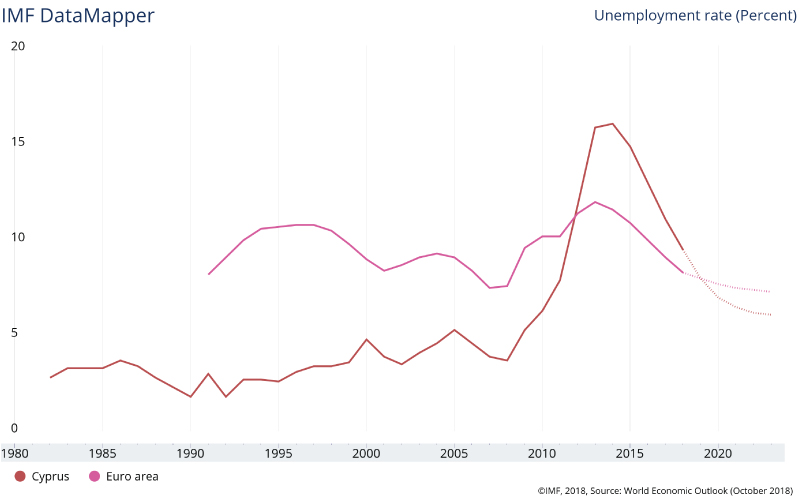Overcoming the challenges of recent years, the Cypriot economy has followed a solid growth path and has maintained its status as one of the fastest growing economies in Europe.
According to a recent study made my KPMG Cyprus, after growing by 3,9% in 2017, the Cypriot economy continued its growth in 2018, with GDP growth over 4% (almost twice the EU average) and unemployment dropping to 8%. Inflation in Cyprus is also down to 0,5% which is significantly lower than the Euro Area average of 2,1%. Because of this significant growth, the Cyprus’ sovereign rating has been constantly upgrading by various international rating agencies with the latest upgrade to “Investment Grade” given by Fitch in October 2018.

The island’s GDP growth is forecast to reach a 4,2% in 2019 and then to steadily decelerate down to 2,4% in the next 5 years which will still be higher than the EU average. Unemployment in Cyprus is also forecast to drop to 6,1% by 2023.
The island’s key growth factors are tourism, shipping, real estate and financial and professional services sectors.
Tourism sector is the biggest and most stable pillar of the Cyprus economy with revenue from tourism representing more than 13% of GDP. The island boasts over six months of sun and sea and has the densest concentration of Blue Flag beaches, ranked as a few of the best in Europe. Its geographical diversification of tourists arriving in Cyprus and its Mediterranean climate ensures the sustainability of the sector’s performance. According to the official statistics of the government, the revenues from tourism hit a double-digit percentage increase in the previous two years and 2018 was the most successful year ever recorded.
Cyprus is considered the largest ship-management centre in the EU and one of the three largest worldwide. The island is home to more than 200 ship-owning and ship-managing companies and the Cypriot Ship Registry ranks 3rdin Europe and 11th globally.
Real Estate sector is one of the fastest growing sectors of the island with 21% and 24% increase in Contracts of Sale in the last two years respectively. Last year, non-nationals bought 103% more properties than 2017, reaching a 48% share of the overall market. The Cyprus Investment Program, the numerous new investments in tourism infrastructure and the increased domestic demand boosted the growth in real estate activities.

Located geographically in a business-friendly time zone and having spent decades building an economy based on the provision of top-quality professional services, Cyprus is internationally recognised as a leading provider of financial and professional services. Cyprus’ educated workforce, attractive tax system, the legal and regulatory framework are the main driver of the growing sector of services.
Energy sector is an upcoming pillar of the Cyprus economy as the discovery of vast natural gas reserves attracted worldwide attention and considerable international investment in both hydrocarbons and renewables. The natural gas discoveries combined with the island’s strategic position will transform Cyprus into a regional energy hub, cementing the island’s status as a key player in the Eastern Mediterranean. The Republic of Cyprus has already signed contracts for offshore hydrocarbons exploration with energy giants Exxon Mobil and Qatar Petroleum as well as major European companies Eni and Total and exploratory drilling has already begun.

